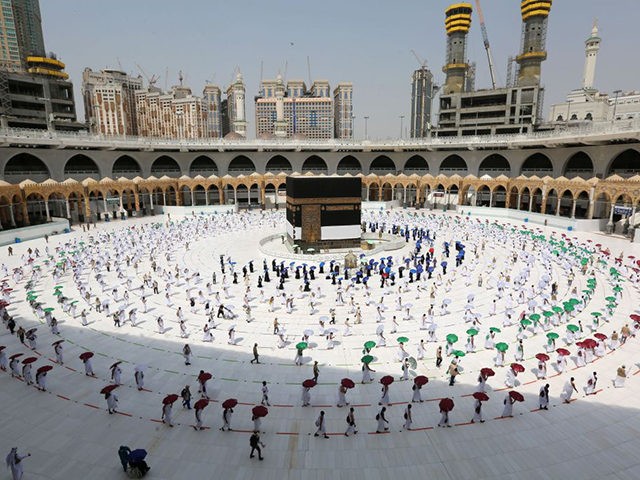The Hajj, Islam’s annual pilgrimage to Mecca, Saudi Arabia, began Wednesday with strict government imposed social distancing measures severely limiting attendance of the event — 1,000 pilgrims participated compared to last year’s 2.5 million.
The government required Pilgrims to quarantine in a designated hotel prior to the start of Hajj rituals today, the official Saudi Press Agency (SPA) reported. Participants “gather daily at a meeting point in front of the hotel as designated by the [Saudi] Ministry of Hajj and Umrah [lesser pilgrimage to Mecca] to be transported via buses to the city’s holy sites. Each individual has been assigned a seat for the entire duration of the [five-day] Hajj pilgrimage,” Saudi news outlet Al Arabiya reported.
“A health leader has been assigned to each group of 50 pilgrims to ensure safety measures, including wearing a mask and social distancing, are implemented at all times,” the SPA said.
For the first time in almost a century of Saudi rule over Mecca, people from outside Saudi Arabia were barred from participating in the annual pilgrimage, which all able-bodied Muslims are required to complete once in their life as one of the five pillars of Islam.
In the face of a rising number of coronavirus cases in Saudi Arabia — one of the highest caseloads in the Middle East — the kingdom’s government imposed strict virus prevention measures on this year’s event. Through an online vetting system, the government selected just 1,000 people to participate in the Hajj, comprised of 70 percent Saudi foreign residents and 30 percent citizens. Normally the event draws millions of participants.
“There are no security-related concerns in this pilgrimage, but (downsizing) is to protect pilgrims from the danger of the pandemic,” Saudi Arabia’s Director of Public Security, Khalid bin Qarar Al-Harbi, said.
This year pilgrims “were given elaborate amenity kits that include sterilized pebbles for a stoning ritual [in which pilgrims throw stones at pillars representing the devil in a symbolic “casting away of evil”], disinfectants, masks, a prayer rug and the ihram, a seamless white garment worn by pilgrims,” a Hajj ministry program document revealed.
The government also assigned pilgrims electronic wristbands that allow authorities to monitor their movement, Bloomberg reports. The tracking bracelets connect to pilgrims’ smartphones via Bluetooth.
The Saudi government has barred foreign press from this year’s hajj, normally a massive global media event drawing large numbers of international journalists. The hajj represents the crown jewel of the Kingdom’s highly lucrative religious tourism industry, which generates revenue “equivalent to about 2.7 percent of Saudi Arabia’s gross domestic product,” according to Bloomberg.
Saudi Arabian authorities say that anyone found guilty of violating coronavirus restrictions during this year’s hajj will incur a “10,000 riyal [$2,666] fine.” A Saudi interior ministry official told the state’s official news agency that “anyone apprehended without a permit at Mina, Muzdalifah, or Arafat, the main Hajj stations, would be fined, and the amount would double for repeat offenders.”
Pilgrims participating in hajj communal prayers must practice physical distancing, maintaining 1.5 meters of space between them and other participants. This is in stark contrast to the hajj’s traditional mass prayer, in which hundreds of people traditionally gather shoulder-to-shoulder in Mecca’s grand mosque to circle the kaaba, Islam’s holiest shrine, in unison.
Saudi health authorities confirmed 2,779 new coronavirus cases on Sunday alone. By Wednesday, the Kingdom’s total number of cases rose to 272,590, making Saudi Arabia the second-worst hit Middle Eastern country from the Chinese coronavirus after Iran. Saudi Arabia has so far recorded 2,816 deaths from the virus.

COMMENTS
Please let us know if you're having issues with commenting.